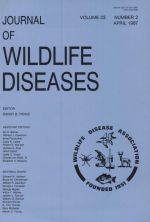Six bengal tigers (Panthera tigris tigris) were immobilized five times at 2-wk intervals with ketamine hydrochloride (ketamine) and xylazine hydrochloride (xylazine) mixtures at different dose levels. Hematology and serum chemistry analyses on blood samples collected at each immobilization remained normal during the study. There were acute changes in hematocrit, chloride, potassium, glucose, and bilirubin as a function of xylazine dose level. The effect of yohimbine hydrochloride (yohimbine) on the depth and duration of immobilization was evaluated in a crossover design with every animal serving as its own control at each dose. Administration of yohimbine resulted in recovery of the animals within 4–8 min in contrast to >60 min with no yohimbine treatment. There were no adverse effects noted with the yohimbine treatment and the tigers did not exhibit a relapse over the next 24 hr. Yohimbine at a dose of 5–15 mg per adult tiger provided effective reversal of 50–150 mg of xylazine per tiger.
BioOne.org will be down briefly for maintenance on 17 December 2024 between 18:00-22:00 Pacific Time US. We apologize for any inconvenience.
How to translate text using browser tools
1 April 1987
YOHIMBINE HYDROCHLORIDE REVERSAL OF KETAMINE HYDROCHLORIDE AND XYLAZINE HYDROCHLORIDE IMMOBILIZATION OF BENGAL TIGERS AND EFFECTS ON HEMATOLOGY AND SERUM CHEMISTRIES
Ulysses S. Seal,
Douglas L. Armstrong,
Lee G. Simmons

Journal of Wildlife Diseases
Vol. 23 • No. 2
April 1987
Vol. 23 • No. 2
April 1987
Anesthesia
Bengal tigers
blood
chemistry
hematology
immobilization
ketamine




